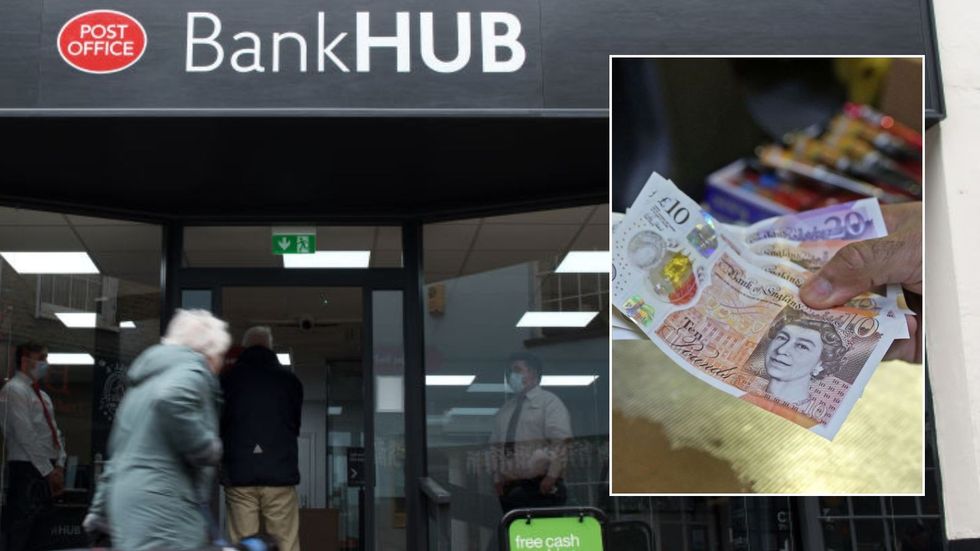Is cash still king? The 'sad reality' for customers as digital payments continue to be 'most popular' way to pay

Legislation was passed as part of the Financial Services and Markets Act, to protect access to cash | GETTY

The majority of UK adults value being given the option to pay in cash, according to latest research
Don't Miss
Most Read
Latest
Although cash remains an essential part of a diverse, resilient payment landscape, Britons are warned of a "sad reality" which can't be ignored.
Cash is typically thought of as the preserve of older generations, vulnerable people and the financially excluded, but many younger adults, live on tighter budgets or less dependable income streams - using cash as an effective way of managing their money, research has shown.
Cash is typically thought of as the preserve of older generations, vulnerable people and the financially excluded, but recent data has shown that the younger generation also place value on have cash as an option to pay.
Cash still holds a significant place in the hearts and wallets of UK consumers, according to latest research by Link, the UK’s cash access and ATM network.
The research reveals that a staggering 81 per cent of UK adults believe it's important to have the option to pay in cash.
This statistic alone challenges the notion that cash is becoming obsolete. It's a clear indication that consumers value choice and flexibility in their payment options, even as they embrace new technologies.
 The gaps in cash access could be filled with banking hubs | GETTY
The gaps in cash access could be filled with banking hubs | GETTY Martin Quinn, director at Campaign for Cash said: “The sad reality for many people is even if they have cash in their pocket, actually spending it over the counter in many shops is getting harder and harder.
"Card only businesses should be avoided, and sooner or later faced with a reduction in trade they will offer customers the choice to pay with cash or card”
The resilience of cash is further demonstrated by its role as a backup payment method.
The majority of cash withdrawn from ATMs isn't spent immediately but kept for future, undetermined use. This behavior indicates that even as we rely more on digital payments, cash serves as a safety net, providing a sense of security and control over our finances.
The recent IT glitches affecting Sainsbury’s, Tesco and Greggs just show how susceptible the whole payment system is to failure and a reminder to everyone that we all rely on cash when digital payments fail, Graham Mott, Director of Strategy at Link explained.
That’s why the recent legislation by Government to protect cash is so important
So, is cash still king?
While its clear that cash remains important, it has evolved as a primary payment method.
Anna Petosa, finance expert at Swag Drop spoke exclusively with GB News about the importance of cash in our society.
She said: "The recent CrowdStrike outage, as mentioned by Graham Mott, Director of Strategy at Link, serves as a poignant reminder of cash's unique advantage: its independence from digital infrastructure.
"In an increasingly interconnected world, the resilience of cash during technological failures is a compelling argument for its continued relevance.
"While cash may no longer wear the crown in terms of transaction volume, it continues to play a crucial role in our financial ecosystem.
"Its importance spans generations and serves multiple purposes - from budgeting tool for young adults to emergency backup for all. The UK Government's recent legislation to protect cash access acknowledges this ongoing significance.
Contrary to popular belief, it's not just older adults who value physical currency. In fact, among 16-24 year olds, 17 per cent stated that cash was their preferred method of payment - a higher percentage than both the 25-34 and 35-44 age groups.
This suggests that cash isn't merely a relic of the past, but a tool that even digital natives find useful, particularly for budgeting and managing tighter finances.
LATEST DEVELOPMENTS:
Rather than proclaiming cash as king or declaring its demise, perhaps we should recognize it as an essential part of a diverse, resilient payment landscape.
In this light, the future of payments isn't about the triumph of digital over physical, but about providing consumers with the freedom to choose the method that best suits their needs at any given moment.
Cash, it seems, will be a part of that choice for the foreseeable future, Petosa explained.










